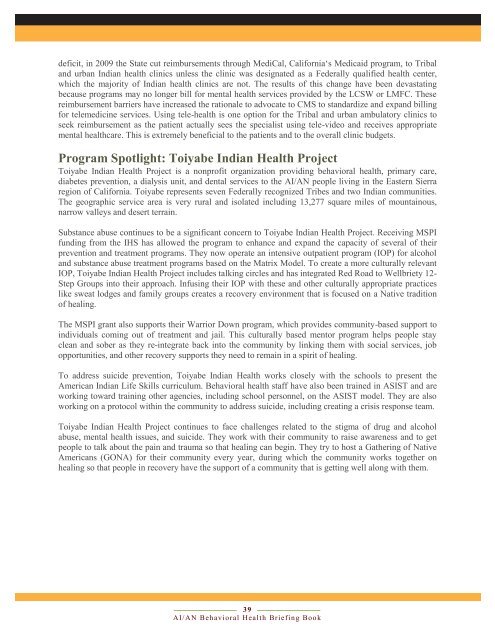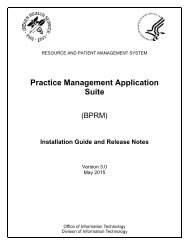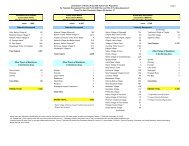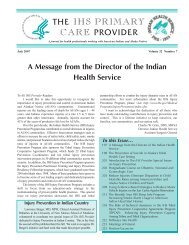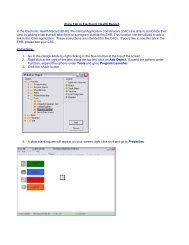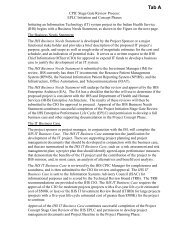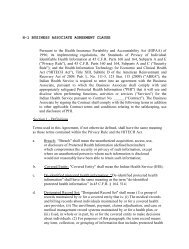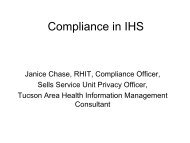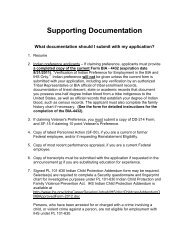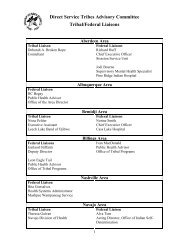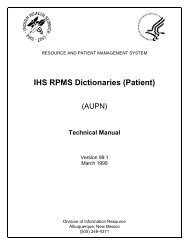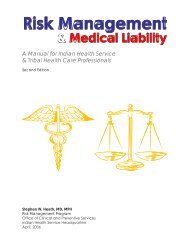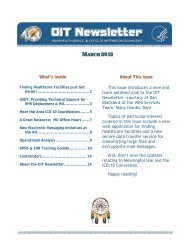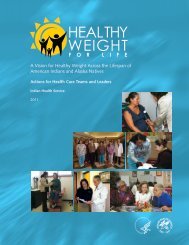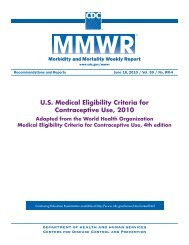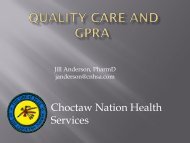American Indian/Alaska Native Behavioral Health Briefing Book
American Indian/Alaska Native Behavioral Health Briefing Book
American Indian/Alaska Native Behavioral Health Briefing Book
Create successful ePaper yourself
Turn your PDF publications into a flip-book with our unique Google optimized e-Paper software.
deficit, in 2009 the State cut reimbursements through MediCal, California‘s Medicaid program, to Tribal<br />
and urban <strong>Indian</strong> health clinics unless the clinic was designated as a Federally qualified health center,<br />
which the majority of <strong>Indian</strong> health clinics are not. The results of this change have been devastating<br />
because programs may no longer bill for mental health services provided by the LCSW or LMFC. These<br />
reimbursement barriers have increased the rationale to advocate to CMS to standardize and expand billing<br />
for telemedicine services. Using tele-health is one option for the Tribal and urban ambulatory clinics to<br />
seek reimbursement as the patient actually sees the specialist using tele-video and receives appropriate<br />
mental healthcare. This is extremely beneficial to the patients and to the overall clinic budgets.<br />
Program Spotlight: Toiyabe <strong>Indian</strong> <strong>Health</strong> Project<br />
Toiyabe <strong>Indian</strong> <strong>Health</strong> Project is a nonprofit organization providing behavioral health, primary care,<br />
diabetes prevention, a dialysis unit, and dental services to the AI/AN people living in the Eastern Sierra<br />
region of California. Toiyabe represents seven Federally recognized Tribes and two <strong>Indian</strong> communities.<br />
The geographic service area is very rural and isolated including 13,277 square miles of mountainous,<br />
narrow valleys and desert terrain.<br />
Substance abuse continues to be a significant concern to Toiyabe <strong>Indian</strong> <strong>Health</strong> Project. Receiving MSPI<br />
funding from the IHS has allowed the program to enhance and expand the capacity of several of their<br />
prevention and treatment programs. They now operate an intensive outpatient program (IOP) for alcohol<br />
and substance abuse treatment programs based on the Matrix Model. To create a more culturally relevant<br />
IOP, Toiyabe <strong>Indian</strong> <strong>Health</strong> Project includes talking circles and has integrated Red Road to Wellbriety 12-<br />
Step Groups into their approach. Infusing their IOP with these and other culturally appropriate practices<br />
like sweat lodges and family groups creates a recovery environment that is focused on a <strong>Native</strong> tradition<br />
of healing.<br />
The MSPI grant also supports their Warrior Down program, which provides community-based support to<br />
individuals coming out of treatment and jail. This culturally based mentor program helps people stay<br />
clean and sober as they re-integrate back into the community by linking them with social services, job<br />
opportunities, and other recovery supports they need to remain in a spirit of healing.<br />
To address suicide prevention, Toiyabe <strong>Indian</strong> <strong>Health</strong> works closely with the schools to present the<br />
<strong>American</strong> <strong>Indian</strong> Life Skills curriculum. <strong>Behavioral</strong> health staff have also been trained in ASIST and are<br />
working toward training other agencies, including school personnel, on the ASIST model. They are also<br />
working on a protocol within the community to address suicide, including creating a crisis response team.<br />
Toiyabe <strong>Indian</strong> <strong>Health</strong> Project continues to face challenges related to the stigma of drug and alcohol<br />
abuse, mental health issues, and suicide. They work with their community to raise awareness and to get<br />
people to talk about the pain and trauma so that healing can begin. They try to host a Gathering of <strong>Native</strong><br />
<strong>American</strong>s (GONA) for their community every year, during which the community works together on<br />
healing so that people in recovery have the support of a community that is getting well along with them.<br />
39<br />
AI/AN Beh avioral <strong>Health</strong> Briefin g Boo k


